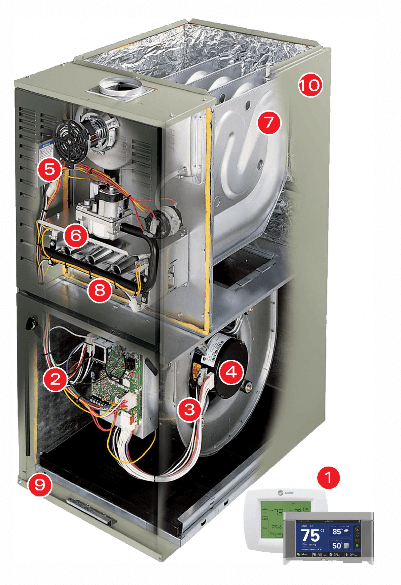
If your heating system fails, you'll discover. Often it's possible to repair your heater, however eventually you might require to buy a brand-new system. When installing a heater becomes your best choice, think about these essential cost factors to consider before buying.
Discover the best heating system
The very first thing you'll require to think about is the type of furnace to install. Given that the majority of furnaces last in between 15 and twenty years, possibilities are the options now readily available didn't exist when your original unit was purchased.
The most common property furnace is powered by gas. The expense of a basic efficiency natural gas heater varies from $2,250 to $3,800. You may sustain higher expenses, depending on the complexity of the set up or if you pick a greater performance system.
Oil heaters preceded gas and are still available in some states, however these heaters tend to be less efficient. They cost $2,200 to $2,500 to install, possibly more if existing duct needs to be adapted. According to CostHelper.com, aspects such as hard-to-reach ductwork, a complicated floorplan or a bigger, more energy effective unit can push the rate as high as $10,000.
You can also choose to install electrical heat, which comes from little registers located around the border of each space. Although the expense of installation averages between $1,800 and $2,700, this type of heat source isn't a good idea for heating big spaces and comes with high energy expenses.
One newer alternative acquiring popularity is a heatpump, which pulls in heat from the air or ground using refrigerant coils. These furnaces can be utilized as cooling units in summer season, but many can't run in very cold environments, limiting their efficacy.
Heater efficiency
Gas heating systems include a host of choices which can impact their price.
The very https://furnace-repair-calgary.ca first is heat output, measured in British Thermal Units (BTUs); an "average" home is well served by a 60,000 BTU heater. Systems with greater BTU ranking aren't always much better for smaller sized homes, because they'll cost more and struck perfect temperature levels too quickly, then turned off, leading to an inconsistent comfort level.
Furnace efficiency is the next factor to consider. Older-model furnaces were often rated 80 percent efficient or less, which means 20 percent of the heat produced was lost to squander. Numerous brand-new designs are ranked 90 percent or much better, with some in the 94 to 95 percent range. This little dive in efficiency translates to a decrease in energy costs
It's likewise important to figure out how successfully a gas heating system can heat your home, in big part determined by its "staging." Older heaters were one phase, meaning they always performed at complete power. Numerous newer furnaces are 2 stage, capable of running at 65 percent when first launching to save fuel, and after that increase to 95 percent as needed. More pricey three phase models also exist, which can run anywhere from 33 to 90 percent power in 1 percent increments.
Furnace labor expenses.
Installing a furnace likewise features labor expenses. The cost of labor isn't repaired, however many companies charge around $75 per hour for a certified installer and $50 for a helper. For an 8-hour install, this comes to $1,000 for labor alone. Set up costs may run greater if extensive duct repair work or modification is necessary, or if a brand-new heater is considerably smaller or bigger than an existing unit.
2 service warranties govern heater installs and function. The very first is the maker's guarantee, which features the furnace and protects versus problems in the heater itself, such as inoperable fans or pilot burner that will not stay lit. A contractor's warranty covers the labor included to make repairs if the heating system does not work appropriately and is often good for a period of 5 to 10 years. Some professionals charge more for extended warranties.
Make certain to get any service warranty in writing; likewise make certain that it defines exactly what gets covered, for the length of time and what the professional will do to fix the issue. Although the costs of setting up a furnace differ considerably, you can prevent rate mistakes by doing your own research.